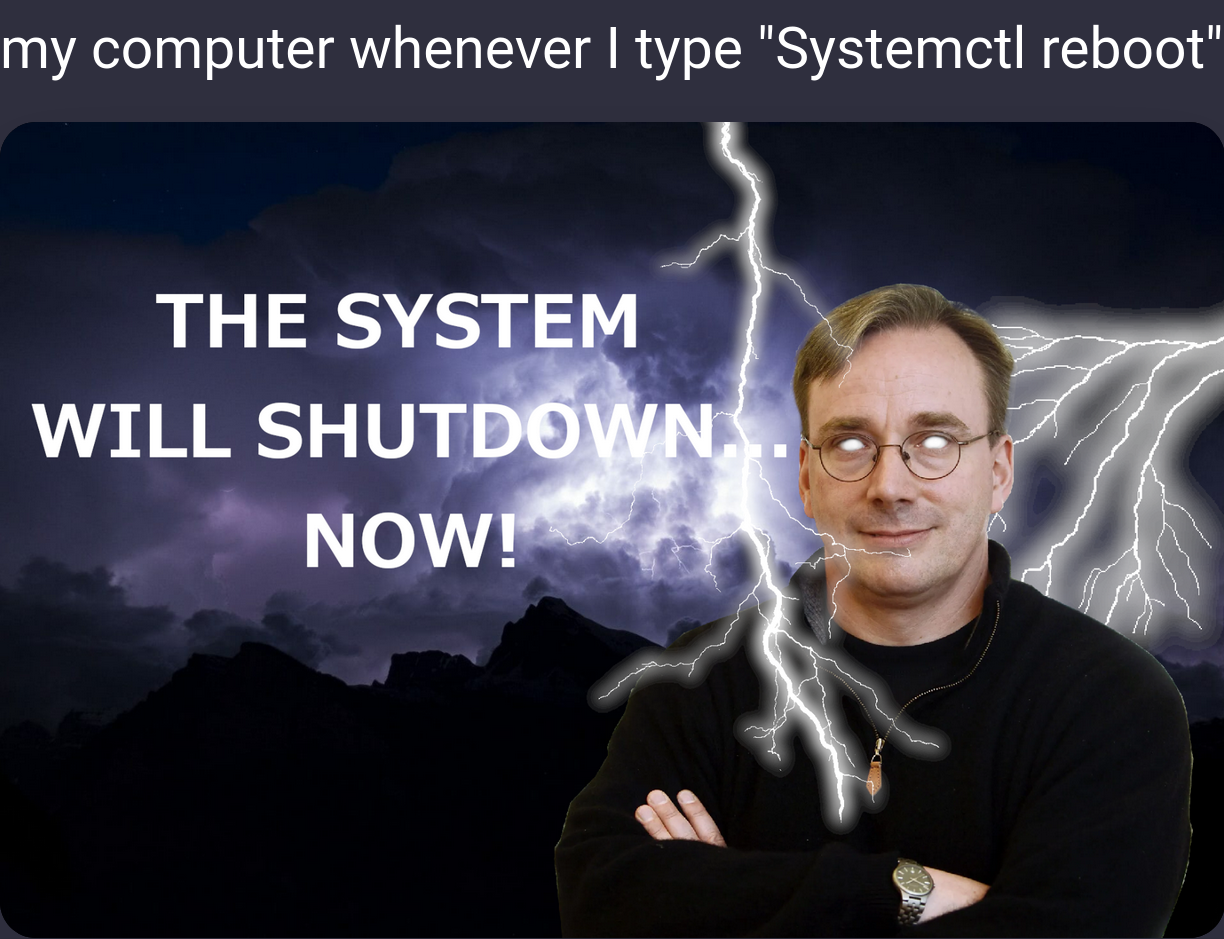What is the difference between that and simply reboot? Does systemctl reboot have any benefits?
linuxmemes
Hint: :q!
Sister communities:
- LemmyMemes: Memes
- LemmyShitpost: Anything and everything goes.
- RISA: Star Trek memes and shitposts
Community rules (click to expand)
1. Follow the site-wide rules
- Instance-wide TOS: https://legal.lemmy.world/tos/
- Lemmy code of conduct: https://join-lemmy.org/docs/code_of_conduct.html
2. Be civil
- Understand the difference between a joke and an insult.
- Do not harrass or attack members of the community for any reason.
- Leave remarks of "peasantry" to the PCMR community. If you dislike an OS/service/application, attack the thing you dislike, not the individuals who use it. Some people may not have a choice.
- Bigotry will not be tolerated.
- These rules are somewhat loosened when the subject is a public figure. Still, do not attack their person or incite harrassment.
3. Post Linux-related content
- Including Unix and BSD.
- Non-Linux content is acceptable as long as it makes a reference to Linux. For example, the poorly made mockery of
sudoin Windows. - No porn. Even if you watch it on a Linux machine.
4. No recent reposts
- Everybody uses Arch btw, can't quit Vim, and wants to interject for a moment. You can stop now.
Please report posts and comments that break these rules!
Wondering the same
Edit: after a quick google session it seems like usually the reboot command is linked to systemctl so it should be pretty much the same thing as far as I understand.
reboot is linked (aliased) to your init program. In the case you are using systemd then it's equivalent to systemctl reboot.
reboot is generic and calls whatever init program you use.
There are more than one init. Like for example GNU Shepherd.
SysV, Upstart
Gentoo uses OpenRC
runit
sudo reboot -h now
Let's get completely unnecessary:
# systemctl isolate runlevel6.target
# init 6You, like me, must be old.
I also frequently pass -l to the ssh command.
I'm not old, I just like how short the command is
Fair enough, I can respect that.
I didn't get that.
Checked the man and it's not deprecated. So what does it have to do with "old"?
Nowadays most Linux users seem to use ssh user@host. When I was getting started, that didn't exist (or at least I was unaware of it) so I still frequently use the -l flag instead.
Nothing wrong with it, just that at least I mostly encounter its use by experienced users.
OIC. Good to know in case I ever have to work on some old CentOS 5 box lying around ever again.
It also looks kinda proper, using that instead of the @, so when making shell scripts, I might want to prefer this.
sudo shutdown -r now
I just flick the switch on the surge protector.
Alt+SysRq-O
sudo ps -ef | awk '{print $2}' | xargs -r kill -9
sudo reboot 0
...is my go-to.
reboot -f
Because real men login as root and don't care about such silly things like an init system or file system syncing!
To quote the man page:
-f Does not invoke shutdown(8) and instead performs the actual action you would expect from the name.
Can you give Linus a Raiden hat?
Dummy me I type "systemctl restart" instead 🤦♂️
PuTTY: "unexpectedly" disconnected.
Sudo shutdown now -r
Sudo reboot now
run0 reboot
I've repurposed a broken T2 macbook with Ubuntu Server, but any time I issue a reboot command, it just shuts down, and I need to manually walk to my garage and boot it back up.
Does anyone know why I'm so stoopid?
I was having issues with my pc hanging on reboot, so i changed the bios to auto boot when power is applied, and use a smart switch to manually power cycle when it hangs.
Not sure if the mac bios supports that, but its worth a look
Alt-SysReq-B
will shutdown now
'shut down' is two words, here.
the meme spells it like the command shutdown ;-)
I will always use the GUI for this when given the option. Change my mind (you can't).
I won't try but I'll always use the command line.
It's faster for me! Ctrl+alt+T brings up terminal, sudo reboot. Enter.
I often remote into my machine, so it's a lot easier to type the command.
sudo
Live Mas as the root account

A stop job is running for ... (45min / no limit)
